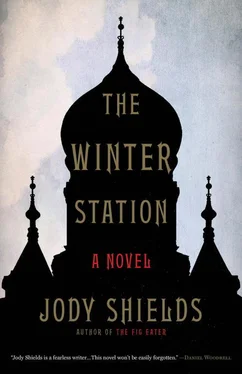“Perhaps an exception can be made for Dr. Lebedev,” Wu suggested.
“Although Dr. Lebedev had a woman’s soft heart, she wouldn’t agree with this sentimental decision about her grave.” Zabolotny’s anger built a wall for benefit of his argument.
The Baron couldn’t let this pass. “Now you speak for Dr. Lebedev?”
“There may be another solution. We can discuss it with the archdeacon at St. Nikolas. Let Maria Lebedev rest in peace,” said Haffkine.
“No, Dr. Haffkine. No one should shelter a poisonous body in the churchyard. The entire cemetery is festering. Thank God it’s sealed under snow, although snow is no disinfectant, regardless of the Baron’s wild claims.” Zabolotny’s lips curved with distaste. “It’s expected you would defend the dead, Baron, when you’re not defending the Chinese. A pity that your medical knowledge is less than your sympathy. Someone should step in and protect you from your own experimenting.”
The Baron was ice. “God’s mercy, have we survived the plague, witnessed countless deaths, to behave with such a lack of grace toward each other?” He gripped his hands together for courage, checked the other faces at the table for support. “Dr. Zabolotny, your insult is not to be borne. Sir, I challenge you to a duel.”
The room exploded with shouts.
Zabolotny’s voice was louder than the others. “Baron, even if you were half your age, I wouldn’t consent to a duel.”
The Baron gently excused himself without anger or haste. No one followed him from the room or urged Zabolotny to apologize.
* * *
Inside St. Nikolas Cathedral, the Baron steered Messonier up the shallow steps of the sanctuary. The church was unlit, had been closed for over a month, and they were trespassing. They walked through the royal gates in the center of the towering iconostasis, where only clergy were allowed, careless of the wet trail left by their boots. In the sanctuary by the chapel of prothesis, they huddled together to wait, comforted by the lingering scents of myrrh, incense, and beeswax candles from the vestry. The altar was covered with a cloth, a frozen white drape, anchored by shadowy holy vessels and a seven-tiered candelabra. A boy had been paid to alert them when the vehicles arrived in the churchyard. The Baron dozed under the soft creaking sway of the building, a cocoon of woven timber, until nudged awake by Messonier.
A ghost of movement at the far end of the building. The two men slowly stood up, the Baron’s knees stiff and aching from the cold. A thread of light, a thin gray vertical, signaled the opening of the front doors. The light widened and vanished as someone entered and closed the door. Their eyes strained in the dark to find the figure attached to the barely perceptible approaching footsteps. A moving grayness separated itself from the room, followed by colder air as the boy materialized in front of them.
“They’re here.”
They waited a few minutes, snugging their heavy sheepskin coats tight, before slipping out of the church. The Baron and Messonier ducked behind two wagons drawn up in front of St. Nikolas and watched a group of men, dark silhouettes, gathered in the adjoining cemetery. Soldiers? Corpse carriers?
When it was clear they hadn’t been seen, Messonier swung himself into the back of a wagon, landing with a hard jolt. He crawled over to huge metal cisterns upright against the wagon rails, wrapped in heavy quilted cloth and animal hides. The lids were tightly fastened and couldn’t be forced open. He shoved the cistern and liquid sloshed inside. The other wagons were loaded with shovels, pickaxes, cords of firewood, stacks of tin buckets, boxes of tools, ropes, and chains. Weapons for dismantling.
“Curse your mother!” a voice shouted. Three men crossed the cemetery in the direction of the church.
Messonier jumped down and, crouching behind the Baron, moved alongside the wagons back into St. Nikolas. Inside the cold hive of the church nave, they gasped, catching their breath, a fog of wreathing white evidence.
The Baron refused to whisper. “Let’s wait here. No need to freeze to watch the grave robbers dig.”
“There are more men outside than I anticipated. If we’re caught, what do we confess?”
“Nothing. Tell them you’re a cloistered monk. The church forgives.”
“But not the men in the cemetery.”
“More likely they’ll break into St. Nikolas for the silver candlesticks.” The Baron was relieved by Messonier’s smile at his weak joke.
“I resent hiding here like a thief.”
“Patience, friend. We have the advantage of stealth once the men are busy working.” The Baron remembered a window overlooking the cemetery. “Let’s go upstairs. For the view.”
At the top of a narrow staircase, the window framed a number of fires burning across the cemetery. There were dark circles where snow had melted.
“Now I understand. They must have fire and water,” the Baron whispered.
Messonier turned away from the window. “I can’t watch.” His strained cheer had vanished and he was tense with anticipation. He insisted they couldn’t wait, they must risk entering the cemetery immediately.
Outside, snow had leveled the landscape like a stationary flood, hip-deep in places, and the effort to walk around the gravestones strained their hearts and lungs. Breathless, the Baron asked Messonier to stop and rest. He picked up a stone left in the crook of a tree branch, just for luck.
At a slight distance, visible through thick brush, a steaming cauldron hung on a stand over a log fire. Moving as slowly as sleepwalkers, men filled buckets with hot water from the cauldron, then poured them into a partially excavated grave. A fury of steam rose from the hole as the frozen earth bubbled and softened. Vapor wisped from the exposed coffin. A man jumped into the grave, landed on top of the coffin. An ax was placed in his hand and he splintered the rotten wood into an opening large enough to remove the corpse. At the side of the grave, another man waited with ropes to free the frozen body from the coffin.
Messonier clapped his hand over his mouth to stop his cry. They turned away from the grave diggers, their axes and fires, moved deeper into the cemetery.
“What’s this?” The Baron noticed a long strip of red cloth tied around a gravestone. Then he understood. The strips marked the graves of plague victims to be disinterred by the men. The Baron kept this discovery to himself.
“Are we closer to her grave?” The Baron avoided using Maria’s name so as not to upset Messonier.
His answer was hesitant. “I believe so. Yes.”
Messonier turned around to get his bearings, place himself in relation to the gate, two spindly trees, the cross atop a monument. “I remember the church roof was visible from a certain angle near her grave. But this side or the other side? I think it’s this direction.”
They skirted a small copse of trees. The Baron’s nervousness increased, and he stayed close behind Messonier. A spark, a bright point, moved in their direction. Frightened, they waited, and it silently passed by. Or perhaps whoever carried the light was invisible.
Messonier became increasingly disoriented in the unfamiliar landscape. The hood of his coat was loose, and his breathing was strained. The Baron watched his every step, fearing he’d shout or confront the men.
Lost in the forest. The Baron remembered his babushka’s folktale of Baba Yaga. The witch lived in a house mounted on the legs of a chicken so she could chase her victims. He grasped Messonier’s shoulder. Pull him to earth, pull him back. Messonier stared at the Baron, not seeing him. “If there was sun I’d know the direction.” He took five steps forward, then slipped and fell.
Читать дальше











